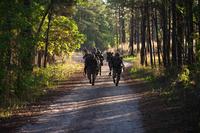If you're still thinking about voting for George Bush on November 2, you owe it to yourself to read this article from today's Washington Post, in its entirety. Bottom line: the Bush administration thinks fighting terrorism is like taking on the Mob; all you have to do is lock up the top bosses, and the gang will fall apart.
What a pleasant little world we'd live in, if that were true. It ain't. Because Al Qaeda isn't a mafia, with a small band of non-replaceable criminal chiefs. It's a cancer. And, by misdiagnosing the problem, the White House is helping it spread.
Bush conducts the war on terrorism above all as a global hunt for a cast of evil men he knows by name and photograph. He tracks progress in daily half-hour meetings that Richard A. Falkenrath, who sometimes attended them before departing recently as deputy homeland security adviser, described as "extremely granular, about individual guys." Frances Fragos Townsend, who took the post of White House counterterrorism and homeland security adviser in May, said in an interview that Bush's strategy -- now, as in the war's first days -- is to "decapitate the beast..."
Townsend, the White House terrorism and homeland security adviser, gives two framed courtroom sketches from a former life a place of honor on her West Wing wall. The color portraits, from 1990, depict her as lead prosecutor in a case against New York's Gambino crime family. When she took her White House job in May, she told the Associated Press that the transition from organized crime to terrorism "actually turns out not to be that big a leap." She added, "Really in many ways you're talking about a group with a command-and-control structure..."
Students of al Qaeda used to speak of it as a network with "key nodes" that could be attacked. More recently they have described the growth of "franchises." Gordon and Falkenrath pioneered an analogy, before leaving government, with an even less encouraging prognosis.
Jihadists "metastasized into a lot of little cancers in a lot of different countries," Gordon said recently. They formed "groups, operating under the terms of a movement, who don't have to rely on al Qaeda itself for funding, for training or for authority. [They operate] at a level that doesn't require as many people, doesn't require them to be as well-trained, and it's going to be damned hard to get in front of that..."
Marc Sageman, a psychologist and former CIA case officer who studies the formation of jihadist cells, said the inspirational power of the Sept. 11 attacks -- and rage in the Islamic world against U.S. steps taken since -- has created a new phenomenon. Groups of young men gather in common outrage, he said, and a violent plan takes form without the need for an outside leader to identify, persuade or train those who carry it out.
The brutal challenge for U.S. intelligence, Sageman said, is that "you don't know who's going to be a terrorist" anymore. Citing the 15 men who killed 190 passengers on March 11 in synchronized bombings of the Spanish rail system, he said "if you had gone to those guys in Madrid six months prior, they'd say 'We're not terrorists,' and they weren't. Madrid took like five weeks from inception."
Much the same pattern, officials said, preceded deadly attacks in Indonesia, Turkey, Kenya, Morocco and elsewhere. There is no reason to believe, they said, that the phenomenon will remain overseas.
Such attacks do not rely on leaders as the Bush administration strategy has conceived them. New jihadists can acquire much of the know-how they need, Sageman and his counterparts still in government said, in al Qaeda's Saudi-published magazines, Al Baatar and the Voice of Jihad, available online...
Downing, Bush's first counterterrorism adviser after Sept. 11, said in a 2002 interview that hunting down al Qaeda leaders could do no more than "buy time" for longer-term efforts to stem the jihadist tide. This month he said, "Time is not on our side."
"This is not a war," he said. "What we're faced with is an Islamic insurgency that is spreading throughout the world, not just the Islamic world." Because it is "a political struggle," he said, "the military is not the key factor. The military has to be coordinated with the other elements of national power."
Many of Downing's peers -- and strong majorities of several dozen officers and officials who were interviewed -- agree. They cite a long list of proposals to address terrorism at its roots that have not been carried out. Among them was a plan by Wendy Chamberlin, then ambassador to Pakistan, to offer President Pervez Musharraf a substitute for Saudi funding of a radical network of Islamist schools known as madrasas. Downing backed Chamberlin in the interagency debate, describing education as "the root of many of the recruits for the Islamist movement." Bush promised such support to Musharraf in a meeting soon after Sept. 11, said an official who accompanied him, but the $300 million plan did not survive the White House budget request.
THERE'S MORE: Hoo boy, is TM Lutas annoyed by this post.
"Kerry has literally, and publicly, likened the fight against terrorism to prosecutorial efforts against gambling and prostitution. That's what the whole thing about "terrorism as nuisance" was about. President Bush has personally and publicly derided this idea. The idea that it is Bush that is the terrorists = mafia candidate is so far out there that my only question is, aren't you embarrassed? When you discount Bush's own words and go with a Washington Post article as being more authoritative, you really do need to justify such an odd decision with some sort of evidence. And given Kerry's public statement saying he would fight terrorism as he fought gambling and prostitution when he was a DA, not even mentioning Kerry's stand just shows how much you're in the tank for Kerry, no matter what. If you'd have said go third party or stay home, I'd respect that. As is, I'll just read your actual defense technology posts where you do a decent job.
But I'm not "embarrassed," and here's why: Yes, Bush says he's treating the fight against Islamic extremism like an all-out, throw-everything-you-got-at-em war. But many of his actions -- including tapping a former Mob prosecutor for anti-terror duties, undervaluing American financial and media "soft power," and focusing on high-level individuals -- undercut those assertions.
Now , Lutas is right; Kerry is a former prosecutor. But ironically, he seems less enamored of the Mafia model than Bush. And let's look at that "nuisance" comment again. It seems to me that it's not a model for fighting Islamic extremism. It's a description of what our world would feel like, once that struggle has been won.
''We have to get back to the place we were, where terrorists are not the focus of our lives, but they're a nuisance,'' Kerry said. ''As a former law-enforcement person, I know we're never going to end prostitution. We're never going to end illegal gambling. But we're going to reduce it, organized crime, to a level where it isn't on the rise. It isn't threatening people's lives every day, and fundamentally, it's something that you continue to fight, but it's not threatening the fabric of your life.''
This analogy struck me as remarkable, if only because it seemed to throw down a big orange marker between Kerry's philosophy and the president's. Kerry, a former prosecutor, was suggesting that the war, if one could call it that, was, if not winnable, then at least controllable. If mobsters could be chased into the back rooms of seedy clubs, then so, too, could terrorists be sent scurrying for their lives into remote caves where they wouldn't harm us. Bush had continually cast himself as the optimist in the race, asserting that he alone saw the liberating potential of American might, and yet his dark vision of unending war suddenly seemed far less hopeful than Kerry's notion that all of this horror -- planes flying into buildings, anxiety about suicide bombers and chemicals in the subway -- could somehow be made to recede until it was barely in our thoughts.








